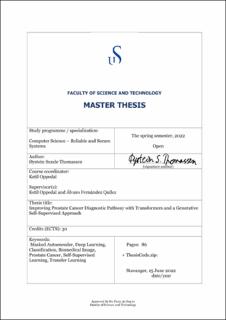Improving Prostate Cancer Diagnostic Pathway with Transformers and a Generative Self-Supervised Approach
| dc.contributor.advisor | Ketil Oppedal | |
| dc.contributor.advisor | Álvaro Fernández Quílez | |
| dc.contributor.author | Thomassen, Øystein Sunde | |
| dc.date.accessioned | 2022-09-23T15:51:18Z | |
| dc.date.available | 2022-09-23T15:51:18Z | |
| dc.date.issued | 2022 | |
| dc.identifier | no.uis:inspera:92613534:68590450 | |
| dc.identifier.uri | https://hdl.handle.net/11250/3020970 | |
| dc.description.abstract | Prostate cancer is the second most occurring cancer and the sixth leading cause of cancer among men worldwide. The number of cases are expected to increase due to population growth and increase in expected lifetime. The screening test for prostate cancer is not without risk and there is chance of over-diagnosis with the traditional screening. The magnetic resonance imaging (MRI) examination is an essential tool and a comfortable method for diagnosing cancer. If some of the screening methods can be replaced by accurate MRI examinations it will be more comfortable for the patients. This thesis will explore how masked autoencoders with a generative self-supervised approach can improve diagnosis of prostate cancer from MRI images. Computer vision is used in many ways in the field of medical imaging. Hopefully computer vision based on deep learning and transformers can improve the field of medical imaging. However, the state of the art deep learning models require pre-training on huge amounts of unlabeled data and fine-tuning on large amounts of data. This thesis investigates if a masked vision transformer can learn to predict prostate cancer lesions on a limited amount of data. The final results suggest that a simple model of small size is not sufficient to for prediction prostate cancer. | |
| dc.description.abstract | ||
| dc.language | eng | |
| dc.publisher | uis | |
| dc.title | Improving Prostate Cancer Diagnostic Pathway with Transformers and a Generative Self-Supervised Approach | |
| dc.type | Master thesis |
Tilhørende fil(er)
Denne innførselen finnes i følgende samling(er)
-
Studentoppgaver (TN-IDE) [866]
Studentoppgaver i informasjonsteknologi, datateknikk / kybernetikk, signalbehandling
